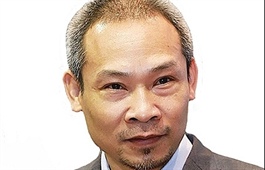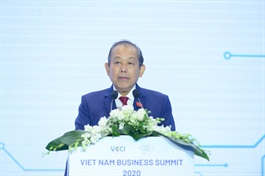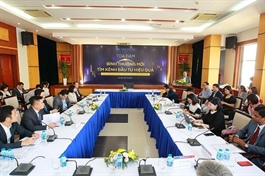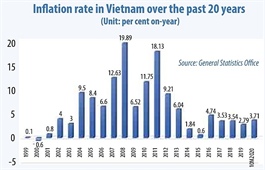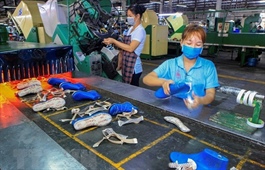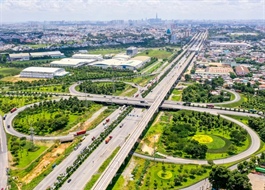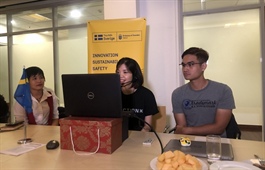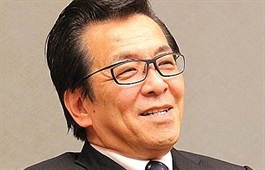VBS 2020: Towards a sustainable and digital future
VBS 2020: Towards a sustainable and digital future
Panel discussion participants at Vietnam Business Summit (VBS) 2020 advised that to build resilience and emerge stronger through this health crisis, businesses in Vietnam need to rethink business structure, embrace digitalisation, and engage the workforce in a more sustainable way.
This was highlighted at Vietnam Business Summit (VBS) 2020 by Dinh Thi Quynh Van, general director of PwC Vietnam. VBS 2020 is one of Vietnam's largest annual international business events held by the Vietnam Chamber of Commerce and Industry in Hanoi yesterday (November 12).
PwC Vietnam is the Knowledge Partner to VBS, taking on this exclusive role for the fourth consecutive year.
Under the theme “Digitised Vietnam: Toward Resilient, Responsive and Sustainable Development”, the summit provides a platform for leaders from both the public and private sectors to engage in an open dialogue on the development of key sectors, share experiences of businesses who have found success in Vietnam, and discuss investment opportunities in the digital era. This year, the event saw the participation of around 300 representatives from the business community in Vietnam and foreign investors.
Against the backdrop of COVID-19, the summit covered three key areas: the Vietnamese investment climate and opportunities, smart logistics to enhance its position in the global value chain, and the advancement of high-tech agriculture.
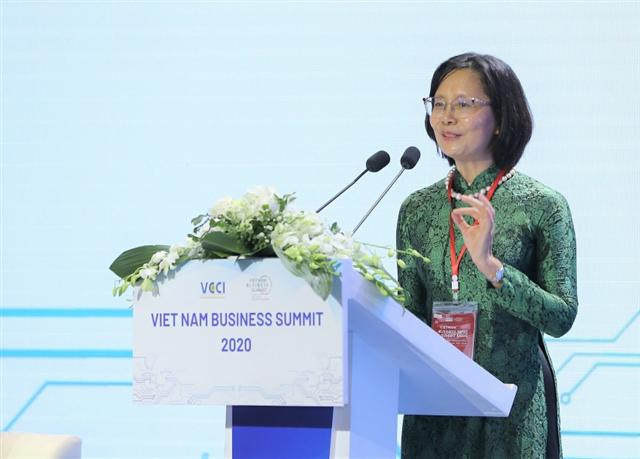
PwC Vietnam general director Dinh Thi Quynh Van giving remarks at VBS 2020 event
|
In her speech about the impacts of COVID-19 on the global and Vietnamese economy, PwC Vietnam general director Dinh Thi Quynh Van highlighted the country’s prospects for growth despite the challenging economic background across the globe.
| PwC Vietnam is the Knowledge Partner to VBS, taking on this exclusive role for the fourth consecutive year. |
Although Vietnam is not immune to the global economic downturn, the country has managed to achieve a rare expected growth of 2.9 per cent in 2020 as projected by the World Bank’s report in August – making it the only economy in ASEAN that can hold on to a positive growth rate this year. This could be largely attributable to some very early and concerted actions taken by the government and the ensuing effective relief measures.
“The impacts of the COVID-19 on both global and local scale are increasingly evident and making enduring changes to the economic landscape. Vietnam’s bright prospect for recovery can be considered remarkable in this context of global downturn. However, to get out of this crisis stronger and in better shape, Vietnam shall be ready to navigate new challenges and opportunities ahead,” said Quynh Van.
In the recent global CEO Panel Survey by PwC in July 2020, two key themes emerged among global CEOs asked about their priorities in the COVID-19 world: the emphasis on digitalisation and the future of more employee-oriented workforce.
Specifically, 41 per cent of CEOs have top priority to make their companies more digital and virtual, and 26 per cent of CEOs plan to develop a more flexible and employee-oriented workforce.
These trends were also deeply reflected in the summit discussion.
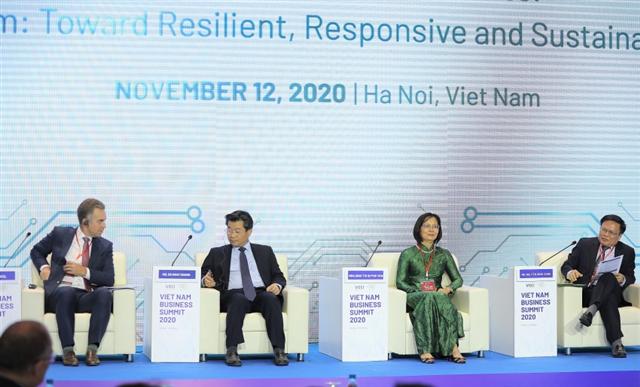
A panel discussion at VBS 2020
|
“This is a time for businesses to take a look at their business models, assess internal capabilities, and make realistic plans for different scenarios ahead. To navigate this new world of uncertainties, businesses need to adopt new mindsets, embrace digitalisation, and proactively make changes to their businesses,” Van noted.
The COVID-19 is accelerating the digital economy, allowing companies who are ahead of the digital transformation journey to have major advantages. According to the same PwC CEO panel survey, 76 per cent of CEOs believe the shift to automation will be enduring, meaning that significant resources will be needed to facilitate digital transformation including upskilling their people.
Going forward, a lot of focus will be placed on what companies need to do to improve the digital capabilities of the workforce.
Commenting on this, Quynh Van said, “The COVID-19 has revealed, and even deepened the skills gap between the current skills and what is required to deliver an agile fit-for-the-future business strategy. The need to upskill is an urgent yet complex problem that will require decision-makers – from both the government and businesses – to come together.”
PwC Vietnam is a member of the PwC network of firms in 155 countries with over 284,000 people who are committed to delivering quality in assurance, advisory, tax, and legal services.
PwC Vietnam established offices in Hanoi and Ho Chi Minh City in 1994 and now have more than 1,000 local and expatriate staff offering integrated services.



